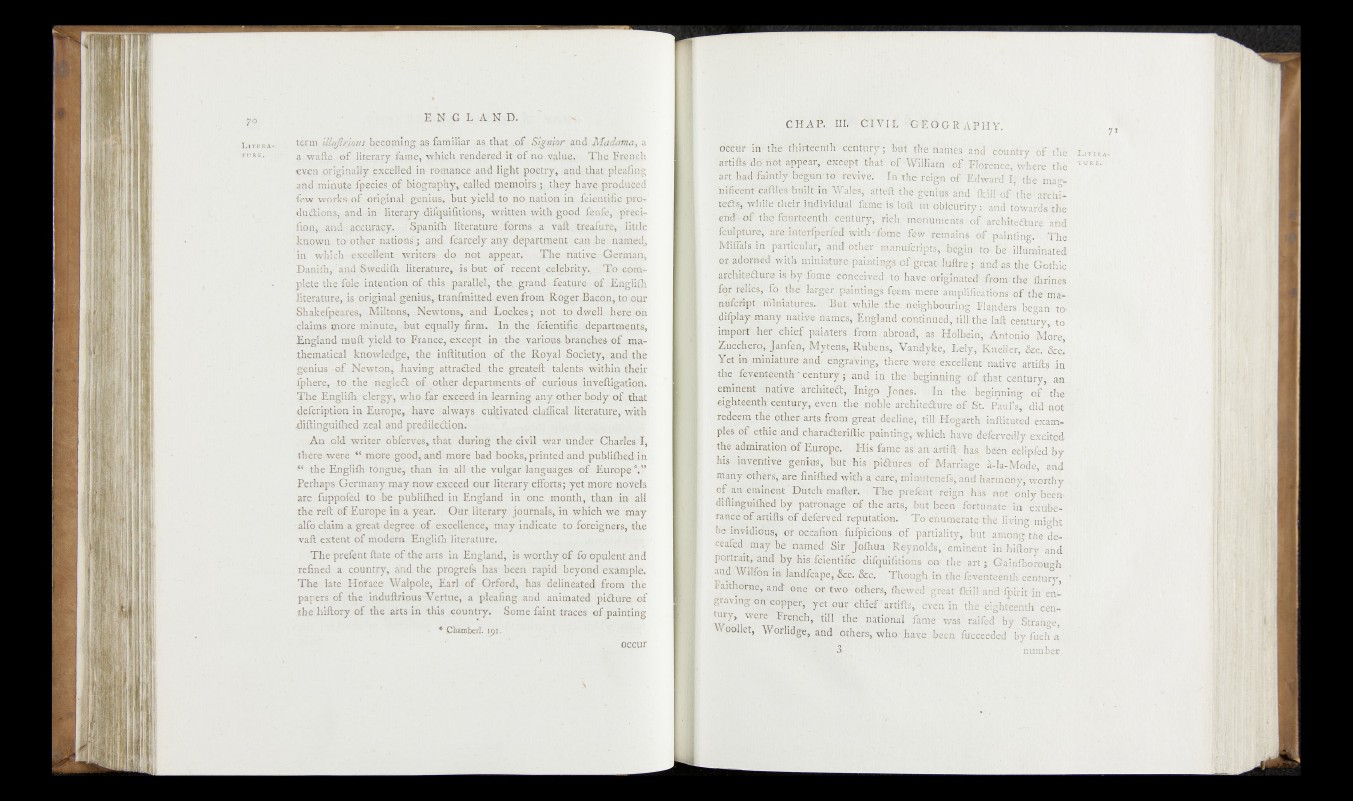
Liter a- term ilh ijl^ ious becoming as familiar as that .of Signer and. M a d am a , a
ture. a wafte of literary fame, which rendered it of no- value. The. pr#nch
.eves, originally excelled in romance and light poetry, and that pleafinjg
and minute fpecies of biography, called memoirs ; they have produced
few works of original genius, but yield to no nation, in fcientific pro-
dufti®nj|$ and in literary difquifitions, written with good fenfe, preci-
fibny and.; accuracy. Spanifh literature forms a vaft treafure-;.. little
known to other nations; and fcCrcely any department can he named,
in which excellent writers- do not appear. The native German,
Danilh, and Swedilh literature, is but of recent celebrity. To com-
- s ' plete the Tole intention of this parallel, the. grand feature of Englilh
literature, is original genius, tnanfmitted even from Roger Bacon, to -our
Shakefpeares, Miltons, Newtons, and Lockes; not to .dw.ell. hgre on
claims more minuis^hd^ '&m. In
England m u lt yield to, Franct,ipkoept.in the various .branches o f ma-
themaqca'l knowledge., the inflitption ,4q f the Rpyal {Sopljeljyu 'anththe
genius o f Newton, having attracted the greateft talents within their
fphere, to the negle<ft:pf other departments of curious inveftigatibn.
The Englilh clergy,; who far exceed in learning auy other body of that
defcription in Europe, have always cultivated claflical literature, with
diftinguilhed zeal and predilection.
An old writer pbferves, that during the civil war under Charles I,
tihdre were “ mote”good,’ and mdre bad books; printed'and publifaed in
“ the Englilh tongue, than in all the vulgar languages''a£iEufdpe^.f’
Perhaps Germany. may now exceed .our ditpfiaiiy efforts; »yet .more rao-dels
are fuppofed to be publifhed in England in ".one month, than in all
the reft of Europe in a year. Our literary journals, in which we may
alfo claim a great degree of excellence,' may indicate to foreigners, the
vaft extent of modern Englilh literature.
The prefent ftate of the arts in England, is worthy of fo opulent.and
refined a. country, and the prdgrefs has been rapid beyond example.
. The late Horace Walpole, Earl of Orford,. has delineated from the
papers of the ihduftripusrVertue, a pleafing and animated picture of
».the hiftory of the .arts in this country. Some faint traces of painting
* Chamberl. u ) i.
occur
7 i
occur in the thrrte'entix century; hut the names and country-of the Liter*
'artifts do,not appear, except that--of William of Florence, where the TURE-
art had faintly begun:to revive.' In the reign of. Edward I, the mag-
h - caftl|similt -i n • W al^jj »’ajt e t 1 if h| genius and {kill o f ’ tide I arc hi*
teCts, while their Individual fame is loft in obfeurity : and towards the
end- of the fourteenth century, rich monuments of architecture and
fculpture, are interiperfed with Tome few remains of painting. •: The ■
Miffals in particular, and other gtndfciipK^begin to be illuminated
or adorned with miniature; 4 J great juftre ; and'as the Gothic
architecture is by fame conceived to have originated .from the fhrines
for relics, ft,i the larger paintings feem mere ampfifidi&ns of the ma-
npfeript miniatures.. But whileJ.the; neighbouring..:Flanders began to -
difplay many native» ndrdcs, England continued,, till the laft century, to
import her chief painters from- abroad, as Holbdfo,. Antonio More
Zucchero, Janfen, Myteiks, Rubens, Vandyke, Lely, Knelieiy&c. & c’
Yet in miniature and engraving, there were excellent native artifts in
the feventeenth' century • and in the: beghiningfof .that .century, an
eminent native ’architect, ■ Inigo, joncs. In the beginning of the ■ '
eighteenth century, even the. noble architecture of St. Paul’s^ did not 1
redeem the other arts from great decline, till Hogarth inftituted examples
of ethic and charaCteriftk painting,; which have de-fervedly excited
the admiration of Europe. His farneus' ail artift has been cclipfed by
his inventive genius, but his piCiurcs of Marriage. a-la-Mode, and
many others, are finiflied with a care, minutehjfs-, and harmony, worthy
aft eminent Dutch mailer. The prefent reign his not., only been:
diftinguilhed by patronage of the arts, but been foftun^e*4n exube- r [l
rance ° f artifts of deferved reputation. * To enumerate the living mip-ht
be invidious, or occafion fufpicions: of partiality,, but among the de- l
eeafedmaybe named Sir Jofhua Reynolds, emme|f§|n hiftory and.
portrait, and by his fcientific difquifitions on the art; Gainftrorbugh ’
and Wilfon in landfcape, &c. &c. '^Though in the fevenfechth centuty, f
Fiuthorne, and one or two others, fhewed and Tphit in eh- .
graving on copper, yet our chief' artifts, even in the eighteenth cen-
S 7’ Were French, till the national fame -wtiS' raifed ;by . Strange,
ohllet, Worhdge, and others,, who. have, been fucceeded by.fuch a
W » .. J ' || IEI - . • number